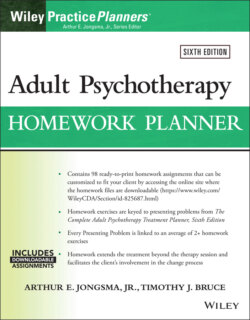Читать книгу Adult Psychotherapy Homework Planner - Arthur E. Jongsma Jr. - Страница 26
На сайте Литреса книга снята с продажи.
EXERCISE 1.C ASSERTIVE COMMUNICATION OF ANGER
ОглавлениеIn this assignment, you are asked to practice expressing your anger in a calm, controlled, and assertive manner on a regular basis at home, at school, or in the workplace. Assertive communication of anger includes the following characteristics:
1 Use of “I” statements—“I” statements reflect ownership of thoughts and feelings. Effective “I” statements are present‐focused and free of manipulative ploys. Use of “I” statements are more likely to reflect statements of personal responsibility.
2 Avoid use of “You” statements that are often blaming, accusatory, or judgmental in nature. “You” statements often focus on the other person's faults and place them on the defensive.
3 Calmly state your reasons for your anger. Refer to specific behaviors and focus more on the present situation and not on past faults of the other person.
4 Use facts instead of judgments.
5 Make requests for positive and specific changes in behavior. For example, “I would appreciate it if you would call and let me know when you are running late.”
6 Express your anger as soon after the specific behavior or event as possible so that your expression of anger can be present oriented.
7 Express anger in a calm and reasonable tone of voice. Clearly, it is best to avoid yelling or talking to the other person in a high‐pitched or accusing tone of voice. Avoid nagging and whining as well.
8 Use active listening skills. After you have expressed your thoughts and feelings in a calm and controlled manner, it is important to listen to the other person's point of view. Remember to listen to other people's thoughts without interrupting. Maintain good eye contact while they are speaking to let them know that you are listening intently to their thoughts and feelings. Try to avoid thinking about what you want to say next.
9 If the discussion becomes tense or heated, remember to take a break to regain your composure and organize your thoughts.
Now that you have been taught effective communication techniques, we encourage you to use these skills on an everyday basis. Please fill out the Assertive Communication Log to record the incidents where you had the opportunity to practice communicating your feelings of anger.
